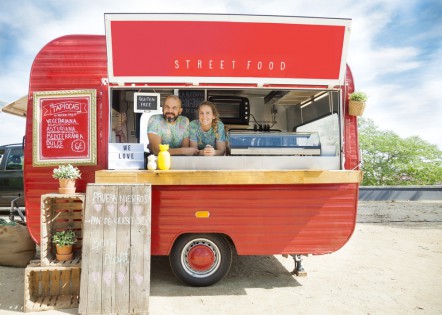Wasp Barcode Technologies: The Barcode Solution People
Four Target Areas To Keep Your Doors Open

Uncertain economic times helped cause a 20-point downshift in
small business confidence over the last year. Approximately 60 percent of UK SBEs felt “optimistic” about their companies’ prospects in 2017 while 10 percent went to the opposite end of the spectrum and felt “pessimistic.” Fast-forward to 2018 and those numbers dropped to 47 per cent and rose to 17 per cent respectively.
While this might seem drastic, it still denotes a SBE public that is cautiously optimistic about its future. This public does, however, harbor concerns over domestic economic conditions and the uncertainty over EU trading relationships. These concerns only help rock a foundation that sees
60 per cent (in general) of start-ups fold within five years.
The first year can be crucial, depending on your niche: Information- and communication-based operations and retailers tend to hold the highest one-year survival rate while property-based are mostly likely to close within that span.

Health and education services offer the best chance to make the five-year mark: These are the
only two types of SBEs with a greater than 50 per cent survival rate after five years. Those likely-to-fold property businesses? They become more stable –
if they happen to make it five years.
The most likely cause should come as no surprise: Money woes and cash flow problems shutter businesses big and small. Late payments of invoices can dry up savings quickly: Money continues to go out but none comes in to replenish the supplies!
[Tweet "Money woes and cash flow problems shutter businesses big and small."]
Overlooked costs of SB operation can also help
sink a fledgling company. Payroll, legal fees, asset management and depreciation each call for their own slice of your budget.
The location you choose also plays its role in spending and survivability. London, for instance, is the
roughest territory for SBs. So many people want to stake their claim in the city and so many ideas overlap: You fight for customers, for space, for notoriety even more, which calls for ingenuity and, of course, cash.
You’re faced with a densely populated area and its educated workforce. You need to pay for your people, and they may well face no shortage of option. Is it surprising the survival rate for
three years hovers near 50 per cent, 3.6 per cent below the national average?
Another reason many businesses go under might surprise you: The founders went in
without a decent understanding of what to expect as SBEs. They dream of being their own bosses and answering to no one and forget minor details such as: What it means to break even; the definition of “customer satisfaction,” and sometimes their very core values.
These people might also run the risk of concentration, or the single-basket supporter. They strike up a good stream of revenue, or the potential for one, and never consider another option. They fail to come up with a Plan B in the event their cash cow dries up or moves along to another pasture.
Along the same vein as lack of planning, improper team composition hits UK and US business almost identically: More than
20 per cent of SBs open their doors without a good idea of with whom they just entered business! It can be hard enough to hire talented employees who might not wish to spend their careers in a SB environment. How much more difficult would you expect it to be if your
management team cannot agree on how to run the operation?
Say you make it to Opening Day: What makes you so different from the other SBs in your niche? Can you describe your
Unique Value Proposition? More to the matter, can you demonstrate it to the waiting public? Is it even something the public wants or needs? Did you check for any pre-existing business models upon which you could base your SB? Did you listen to your clientele?
Money, knowledge, people, and identity: Four necessary components that can make or break your efforts. So what can you do to make them work
in your favor?

First off, always remember: Money matters, no matter what we all might like to imagine. It pays your utilities, rent, employees and suppliers. Know how much you need to start up and run for
at least two years. Plan to succeed. Pay out for
professional advisement to help you navigate the ins and outs of UK SB finances.
Be upfront with your payment terms, including any late penalties. If you need to, credit check clients: Businesses that take this measure tend to reduce their first-year failure chances by
30 per cent.
Mock up a
lean start-up model. Run a trial with the cheapest version of your business and see how your potential market reacts. Positive responses means modify to scale to meet your plans. Negative – or even worse, no – responses: Adapt, reload, and repeat.
This mock-up, even if only used as a thought experiment, would also force you to consider your business plan from the very beginning. For instance, would you be able to easily transition to or support an
online presence? The Internet is used by 76 per cent of adults
daily with the majority of them buying goods or using services online. Fifty-five per cent of the public finds it difficult to support SBs due to a lack of any significant online presence.
How could you make your business online friendly?
People inside and outside your SB factor into your fate. Internally, remember to
lead, not
boss, and show trust in your staff to handle their tasks to the best of their abilities. Allow your supervising personnel to handle some of your tasks so you might focus on other necessities of the day-to-day.
Externally, remember to listen to your customers. Welcome their feedback to your operations and genuinely be receptive to their points of view. Keep tabs on your niche market and see what trends come and go. Your customers help set them!
Know who you want to be when you open your doors. Understand you could face a great deal of competition, depending on your market, and a
brand identity is essential to your survival. Plan out your first year and consider your most effective marketing platforms. Keep your budget in mind but don’t be afraid to shell out a bit to get your name out there!
In addition to these measures, remember to stay passionate about your business! Find your niche, fill it, and remain open to learning and growing. See where you might wind up!
 Uncertain economic times helped cause a 20-point downshift in
Uncertain economic times helped cause a 20-point downshift in  Health and education services offer the best chance to make the five-year mark: These are the only two types of SBEs with a greater than 50 per cent survival rate after five years. Those likely-to-fold property businesses? They become more stable – if they happen to make it five years.
The most likely cause should come as no surprise: Money woes and cash flow problems shutter businesses big and small. Late payments of invoices can dry up savings quickly: Money continues to go out but none comes in to replenish the supplies!
[Tweet "Money woes and cash flow problems shutter businesses big and small."]
Overlooked costs of SB operation can also help
Health and education services offer the best chance to make the five-year mark: These are the only two types of SBEs with a greater than 50 per cent survival rate after five years. Those likely-to-fold property businesses? They become more stable – if they happen to make it five years.
The most likely cause should come as no surprise: Money woes and cash flow problems shutter businesses big and small. Late payments of invoices can dry up savings quickly: Money continues to go out but none comes in to replenish the supplies!
[Tweet "Money woes and cash flow problems shutter businesses big and small."]
Overlooked costs of SB operation can also help  First off, always remember: Money matters, no matter what we all might like to imagine. It pays your utilities, rent, employees and suppliers. Know how much you need to start up and run for at least two years. Plan to succeed. Pay out for
First off, always remember: Money matters, no matter what we all might like to imagine. It pays your utilities, rent, employees and suppliers. Know how much you need to start up and run for at least two years. Plan to succeed. Pay out for 

